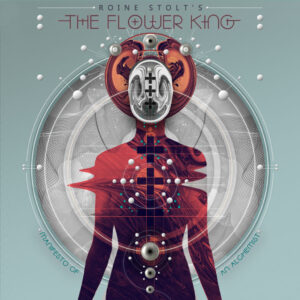With a cast of musicians that includes Marco Minnemann (drums), Michael Stolt (bass and vocals), Jonas Reingold (bass), Hans Froberg and Nad Sylvan (vocals), Manifesto of an alchemist sees progressive legend Roine Stolt return to the Flower King moniker that marked the start of his ascent to he ranks of progressive rock royalty in the 1990s.
Opening with the richly textured synth swirl of rainsong, a track that sees layers of vocal harmonies slowly build only to fade away into the background haze once more, the album truly starts with the funky bass groove of Lost America, a track that harks back to late 70’s prog, specifically King Crimson, whose Starless and bible black is evoked by the calm, Anglophone vocal delivery. A near-ten-minute epic, Lost America captures the America of Scorsese, as seen through the eyes of a bewildered European, the band throwing everything from electric funk (via Jonas’ hotwired basslines) to pulse-raising hard rock (driven by Marco’s expressive percussion) into the mix. It’s a lush, unpredictable opening and it gets the album off to a flying start. Dark synth stabs announce the arrival of the bizarrely-titled Ze Pawns, a track that updates early Genesis with contemporary production, whilst maintaining the sense of mystery that characterises the Steve Hackett period of the band. Listened to on headphones, the track is wonderfully expansive, the liquid guitar sliding beautifully over Marco’s thunderous drums. With the latter half populated with a series of samples that question the role of secrecy in governance (particularly with reference to America’s iniquitous Prism program), the piece has a sharp edge that adds a compelling element of social commentary to the music. That social commentary expands into the “world has gone crazy” refrain of the whimsical High road – the album’s longest song at some twelve minutes in length. Epic, and yet filled with such a sense of wonder that it never feels drawn out, high road sees the band operating at their peak. Of course Roine is a past master when it comes to crafting majestic sonic vistas upon which the listener can gaze, and this track is no exception. The first half of the album concludes with Rio Grande. A svelte eight minutes in length and instrumental to boot, it emerges with a most-remarkable blast of rhythm as the band indulge a penchant for jazz, their astounding musicianship given free rein to roam as it will.
With the sky-scraping instrumental having provided a neat interlude that draws a line under the ambitious undertakings of the album’s first half, the second side opens with the acoustic strum of Next to a hurricane. Short, sweet and with a pop-prog vibe, next to a hurricane is a simple song rendered in a complex fashion, the musicians clearly reveling in the sunny harmonies, but it pales in comparison to the descending madness of the alchemist. Another instrumental piece with a taut, jazzy vibe, the deft percussive work and keyboard shimmies keep the listener on their toes, whilst Rob Townsend’s sax adds further depth to the composition. Its follow up, baby angels is a simple lullaby, and if a slight sense of déjà vu is evoked, it’s because the album has pulled the same trick of following up a lengthy, jazz-infused instrumental with a short, acoustic track twice in a row which, after the lengthier workouts of side one, makes the album as a whole feel a touch unbalanced. With the end of the album looming, the flute-led six thirty wake-up offers a brief moment of pastoral beauty with a Genesis undercurrent before the lengthy the spell of money brings the record to a suitably grandiose close, the heavy guitar tones as pleasing to fans of John Petrucci as Robert Fripp. A dark, slightly sinister piece after the sunnier uplands at the album’s core, the spell of money is a highlight that leaves the listener on a high.
Manifesto of an alchemist has much to recommend it, but it is not a perfect album. The production is stunning, the musicianship faultless, but the sequencing is odd with the weightier material of the first half giving way to a second half that seems far less focused. Not, perhaps, up there with the best albums of Roine Stolt’s packed career, manifesto of an alchemist is truly magnificent for lengthy stretches, but the effect is not quite sustained across the album. 8




